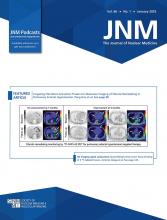Metastatic meningioma is known as a rare and aggressive entity (1). Considering its uncommon nature, no established consensus on management is available. Patients often have a poor prognosis, with survival estimated at 50% at 4 y (2). Grade 2 and 3 meningiomas are associated with aggressive behavior and are classified as malignant disease. Because of the presumed local nature of the disease, extracranial staging is not routinely performed.
[68Ga]Ga-DOTATOC PET/CT offers advantages for differential diagnosis, treatment planning, and response assessment (3). However, this modality is not yet standard for whole-body staging in patients with high-grade meningiomas. With the advent of PET/CT scanners that have a long axial field of view, whole-body scans for these patients would be possible (4).
Two women, aged 54 and 56 y, who had a history of recurrent grade 3 meningioma and initially underwent local therapies, were incidentally diagnosed with spine and lung metastases found on [68Ga]Ga-DOTATOC PET/CT (Fig. 1). PET/CT was performed to guide surgery for intracranial recurrences. Metastatic disease was confirmed with further biopsy. Both patients were asymptomatic. Following multidisciplinary team recommendations, the first patient was treated with stereotactic ablative radiotherapy of the spine. At the 6-mo follow-up, no local failure was detected. The other patient underwent surgery for lung metastasis. She experienced disease recurrence, with multiple new intracranial meningiomas in a shorter follow-up. Radiopeptide 177Lu-DOTATOC treatment followed, but no clear response was noted. Additional systemic therapy with bevacizumab und everolimus was initially planned; however, her clinical status did not allow it, and the patient died because of further progression.
(Left) Three-dimensional PET imaging demonstrating intracranial meningiomas (arrows). (Middle) Axial [68Ga]Ga-DOTATOC PET/CT. (Right) T2-weighted MRI of C7 spine (top) and CT of right lung (bottom). Metastases are marked with arrows. Intensity scale bars are SUV. Injected activity, uptake time, and scan duration were 162 MBq, 54 min, and 15 min, respectively, for patient 1 and 151 MBq, 39 min, and 15 min, respectively, for patient 2.
Given the increasing availability of PET/CT imaging and scanners allowing for routine whole-body imaging, extracranial staging at initial diagnosis or at the time of recurrence could significantly impact the treatment management of malignant meningiomas. Further research is warranted to better define the risk factors for metastatic disease and to identify patients at higher risk who would benefit from staging and corresponding treatments.
DISCLOSURE
No potential conflict of interest relevant to this article was reported.
Footnotes
Published online Nov. 21, 2024.
- © 2025 by the Society of Nuclear Medicine and Molecular Imaging.
- Received for publication June 23, 2024.
- Accepted for publication October 15, 2024.








